- Home
- Gustave Flaubert
Madame Bovary (Modern Library) Page 2
Madame Bovary (Modern Library) Read online
Page 2
Madame Bovary is, among many other things, a quest for meaning in which only one character searches; the others see no point in setting out, or believe they have already arrived. Part of Emma’s plight is the elusiveness of that meaning: between episodes of stasis or “immobilité,” she races from hedonism to self-denial, from country to town, from grisettelike freedom to bourgeois motherhood, from despair to faith, from charitable works to extravagant shopping sprees, just as she does from man to man. Early in her marriage, she endeavors “to find out what precisely was meant in life by the words delight, passion and intoxication, which had seemed so beautiful to her in books.”
Her impossible reverie is to be free and happy in a painted backdrop that is always elsewhere—Italy, for preference. Yet these reveries are themselves manufactured—cheap, hand-me-down versions that she fails to evaluate as fraudulent. She is an embedded product of her culture, as helpless in that guise as the ancient, work-crippled farm servant shuffling in front of the Agricultural Show’s worthies. And yet few characters in fiction feel more real to us than Emma Bovary, endlessly evoked since in other media, including those Flaubert would have deemed “vulgar.”
While taking her fate into her own hands§ and embarking on daring affairs, Emma lacks the superhuman force needed to break free imaginatively from a world in which women were relegated to roles dictated by men (and it was almost impossible for middle-class women to go out and work); the novel has three “Madame Bovarys,” after all—each nominally subsumed. When Emma briefly flirts with bohemianism in the streets of Rouen, she feels disgusted, even fearful. For a provincial woman like Emma, a farmer’s daughter who dislikes the countryside yet does not know the town, this would mean an inevitable slide toward social rejection, prostitution and death.
A moment of genuine insight comes in the chateau at Vaubyessard, the apogee of her social pretensions, when she recalls her widowed father (one of the few sympathetic characters) on the family farm, and the simple sensuousness of her lost existence. The register, for once, is not ironic, but touching: it is set brilliantly at the very moment it seems furthest off, against a window (a central leitmotif in the novel) that has just been shattered by a servant to let in the night air on a stifling ballroom.‖ Yet there is never any implication that she has somehow strayed from her natural milieu, as a conventional novelist might have suggested; instead, her memory remains a painful emotional truth, a shard of loss made more poignant by its context, and from which she is separated by the “lightning flashes” of the present.
This truth certainly fails to save Emma, exiled from herself as much as from the “imbecilic petty burghers” or the “tedium” of her surroundings—which are not only cultural, but stickily physical: her rendezvous with Rodolphe survives on her footwear in the form of mud which, when the servant-boy Justin longingly reaches for the boots to clean them, “came off in powder under his fingers, and which he would watch gently float up in a beam of sunlight.” It is a very rare writer who can combine illicit sex, a boyish crush, precise observation, time’s merciless passage and lyrical beauty in a single image: Shakespeare comes to mind.
“I am pledged to contradictory ideals!” the author complained to George Sand in 1869, “living is a métier for which I am not cut out!” Emma, had she a more articulate insight, might well have cried the same. Yet she acts her various roles—daughter, wife, mother, housewife, secretary, lover, bohemian—to perfection, at least briefly (her failure to feel maternal love for more than short bursts is perhaps the most painful thread in the book); even her cultural accomplishments—drawing, playing the piano—make Charles marvel. The realism of the novel includes its emotional truth: Flaubert’s understanding of human nature is not only complex but, for all his grumpiness and bluster, deeply compassionate; Emma is no material for a sympathetic heroine, but in keeping her true to herself and her situation, Flaubert renders her fate not only moving, but genuinely shocking.
One of Emma’s difficulties is that life itself is not conveniently categorized into genres or registers, high, middling or low, but is a disheveled entity on which we struggle to impose order; it may travel in one direction (Flaubert’s “geometrical straight line”), but it is continually disrupted by dissonant elements, and confused by the interpenetration of the subjective and the objective. Even the performance of a great romantic opera barely holds its own against the whiff of gas and bad breath, a husband’s clumsiness, or inward feelings of worthlessness heightened by the bright stage romance and its inflated characters.
As for direct dialogue, which like most novelists Flaubert found especially challenging and which he crucially reserved for key scenes, it becomes as much about a failure to communicate as an occasional penetration of solitude (Emma is lonely as well as bored). The characters hear what they want to hear, or mishear, or do not listen at all: Emma’s spiritually anguished conversation with the priest being the clearest example: “You are troubled?… doubtless that’s the digestion.” In the celebrated scene in the Agricultural Show, in which Rodolphe’s seduction of Emma in stock phrases is comically interspersed with the equally stock phrases (“For good general husbandry!”) of the farming prizes, Flaubert’s collage technique empties both of meaning, reduces both to simple techniques of persuasion and oppression.
Everywhere in the novel, then, the exquisitely conjured physicality of ordinary life at a particular historical moment is ready to deflate human pretension and roughen its frail hopes, just as Flaubert’s breathtaking descriptions—whether of Rouen’s dawn cityscape or a door’s latch bar knocking a wall—allow us to marvel at the closing gap between words and things; at the miraculous and, finally, the salving possibilities of art.
ADAM THORPE
Nîmes, June 2011
* * *
* I’m assuming the term’s pre-Marxist connotation.
† Who was nevertheless to tell Flaubert that Madame Bovary was the best book he had read in twenty years.
‡ Except in the last chapter, when he refers to the man’s shallow intellect and the “nefariousness of his vanity” (“la scélératesse de sa vanité”).
§ She does so in a very different and more plausible way than, say, the remarkable and headstrong Magdalen of Wilkie Collins’s No Name (1862).
‖ On writing the first lines of the novel, Flaubert wrote to Louise Colet: “This is my third attempt. It’s high time I succeeded or jumped out of the window.”
A NOTE ON THE TRANSLATION
I was lucky enough to find a battered copy of the two-volume first edition (Michel Lévy, 1857) with the characteristic typos of the first printing. It was affordable only because a page had been torn out, I presume by the reader who had scrawled “oeuvre immorale” (“immoral work”) with a quill pen on its flyleaf. The missing page described the senile Duc de Laverdière, bedder of queens (this page of the present edition): particularly upsetting for a royalist.
Alongside this magical relic, I have used the modern edition edited by Jacques Neef (Le Livre de Poche, 1999), which is based on the so-called definitive edition (Charpentier, 1873), and draws on Claudine Gothot-Mersch’s magisterial critical edition (Garnier, 1971). It has long been recognized that the punctuation of the first edition is often clearer and suppler. Alexander Spiers’s celebrated General English and French Dictionary (Paris, 1853) has been my stalwart desk companion.
The peculiar difficulties that Madame Bovary presents for the translator include the author’s fondness for the imperfect tense, varying levels of pastiche, and his habit of extending a certain lexical field (legal, military, etc.) through a whole paragraph;* any translation has to be alert to changes of nuance and tone that are micrometrically calibrated, as well as the changing shades of irony, and attempt to find an equivalent for Flaubert’s verbal mimicry of wordless states or experiences.†
This last is part of Flaubert’s complex music: what he referred to as “style.” No novel, except perhaps Joyce’s Finnegans Wake, has been more carefully composed at the l
evel of sound and rhythm: the action seems to seep from the words themselves, and in real time (when Flaubert occasionally lapses into the present, it is not the historical present used by Dickens).
I made two decisions before embarking on this task some three years ago: that I would track the original syntax wherever possible (without producing “translationese”) in order to preserve its pressure, weight and balance; and that I would only use pre-1857 vocabulary and expressions. To avoid the feeling of period pastiche, my principal models were Henry James and early James Joyce, both later than Flaubert but best corresponding, in my view, to the modernity of his style.
My reasons for keeping strictly within the period lexicon are various, the most important being that the novel’s startling or even shocking nature can only be appreciated when placed back in its own context. If we cannot hope to read this reverberating masterpiece with purely nineteenth-century eyes, that furious “oeuvre immorale,” scratched on the flyleaf, urges us to honor the attempt.
* * *
* See, for instance, the accounting vocabulary on this page: “So she carried over to him …”
† A striking example being the waltz scene on this page, when the words blur and all but decompose as Emma is whirled: “Ils tournaient: tout tournaient autour d’eux …” See also the blending of palm (“paume”) and pommel (“pomme”) when Emma cools her hands on the iron firedogs after refreshing her hot cheeks (this page).
PART ONE
I
We were in study hour, when the Headmaster entered, followed by a new boy dressed in his everyday clothes and by a classroom servant carrying a big desk. Those who were asleep woke up, and each of us rose as if caught working.
The Headmaster nodded at us to resume our seats; then, turning to the usher:
“Monsieur Roger,” he said to him in a near-whisper, “here is a pupil I entrust to you, he will start in the fifth class. If his work and behavior are deserving, he may go up to the seniors, as befits his age.”
Remaining in the corner, behind the door, so much so that we could scarcely make him out, the new boy was a country lad, about fifteen years of age, and taller than any of us. His hair was cut straight across the forehead, like a village cantor, and he looked sound enough and exceedingly embarrassed. He was not broad-shouldered, but his short green woolen coat with its black buttons must have been tight at the armpits and revealed, through the slits in the back of its cuffs, red wrists used to being exposed. His legs, in blue stockings, emerged from yellowish trousers hitched up tight by the braces. He was wearing stout shoes, poorly polished and studded with nails.
We started reciting our lessons. He was all ears, as if attending to a sermon, not daring even to cross his legs or lean on his elbow, and when the bell went, at two o’clock, he had to be alerted by the usher to join us as we lined up.
It was our trick, on coming into class, to toss our caps on the floor so as to have our hands freer afterward; right from the doorway, you had to hurl them under the bench, so that they hit the wall and made lots of dust: that was the thing.
But, whether he had failed to notice this stratagem or had not dared succumb to it, when prayers were over the new boy was still holding his cap on his lap. It was one of those composite types of headdress, which hints at bearskin, chapka, round hat, otterskin hat and cotton bonnet; one of those sorry contraptions whose dumb ugliness has certain expressive depths, like the face of an imbecile. Egg-shaped and bulging with whalebone, it began with three circular sausage shapes; then came alternate lozenges of velvet and rabbit skin separated from each other by a red band, followed by a sort of bag ending in a pasteboard polygon covered with a complicated piece of braid, and from which hung, at the end of a long and too-slender string, a little crisscross of gold thread by way of a tassel. It was brand new; the peak shone.
“Stand up,” said the teacher.
He stood up; his cap fell off. The whole class started to laugh.
He bent down to retrieve it. A neighbor made it fall with a jab of the elbow, he picked it up yet again.
“Do get rid of your helmet,” said the teacher, who was a witty fellow.
A loud burst of laughter from the pupils disconcerted the poor boy, so much so that he had no idea whether he should keep hold of his cap, leave it on the floor or put it on his head. He sat down again and placed it on his lap.
“Stand up,” resumed the teacher, “and tell me your name.”
The new boy pronounced, mumbling, an unintelligible name.
“Again!”
The same mumble of syllables could be heard, showered with hoots from the class.
“Louder!” the master shouted, “louder!”
The new boy, coming then to a drastic decision, opened an enormous mouth and hurled forth at the top of his voice, as if calling out for someone, this word: Charbovari.
A roar shot up, rose in a crescendo on bursts of high-pitched shrieks (we yelled, we barked, we stamped our feet, we repeated: Charbovari! Charbovari!), then kept itself going on single notes, dying down with great difficulty, only to revive at times all of a sudden along a bench’s row, where it gushed forth here and there in a stifled laugh, like an ill-snuffed firework.
Nevertheless, beneath a rain of extra lines, order was restored bit by bit in the classroom, and the teacher, managing to understand the name Charles Bovary by having it dictated, spelled out and reread, ordered the poor devil to go and sit on the idlers’ bench, at the foot of the rostrum. He started to move, but, before heading off, hesitated.
“What are you looking for?” asked the teacher.
“My ca …” said the new boy, casting worried eyes around him.
“Five hundred lines for the whole class!”—delivered in a furious voice—quelled, like the Quos ego, a new squall. “So now keep quiet!” the indignant teacher continued, and wiping his forehead with a handkerchief that he had just drawn from beneath his headpiece: “As for you, new boy, you will copy out for me, twenty times, the verb ridiculus sum.”
Then, in a softer voice, “Well now, you’ll find your cap, it hasn’t been stolen.”
All calmed down once more. Heads bent to books and for two hours the new boy behaved in an exemplary fashion, even if, from time to time, the odd paper pellet launched from a pen nib splattered his face. But he wiped himself with his hand, and remained completely still, eyes cast down.
In the evening, at study time, he pulled his sleeve guards from his desk, set his little pile of belongings in order, painstakingly ruled his paper. We could see him working hard, looking up every word in the dictionary and going to great trouble. Thanks, no doubt, to the willingness he showed, he avoided dropping down a class; because, though he knew his rules of grammar tolerably well, he had scarce any elegance in his turn of phrase. It was his village priest who had started him in Latin; his parents, for reasons of thrift, sending him to college only at the last possible moment.
His father, Monsieur Charles-Denis-Bartholomé Bovary, former assistant-surgeon-major, compromised around 1812 in some conscription scandal and forced at about that time to leave the service, had then turned his personal attractions to advantage by grabbing as it passed a dowry of sixty thousand francs, which presented itself in the shape of a bonnet merchant’s daughter, who had fallen in love with his bearing. A handsome man, boastful, loudly ringing his spurs, sporting side-whiskers that met his mustache, fingers forever bristling with rings, dressed in gaudy colors, he had the look of a gallant, with the facile gusto of a commercial traveler. Once he was married, he spent two or three years living off his wife’s fortune, dining well, rising late, smoking large porcelain pipes, coming back in the evening only after the theater and forever in and out of the cafés. The father-in-law died and left hardly a thing; he was furious, launched out into fabrics, lost some money there, then retired to the country, where he wished to exploit the land. But, as he knew scarcely more about cultivation than about printed calico, and rode his horses rather than turning them out to plow,
drank his cider in bottles rather than selling it in the cask, ate the finest poultry from his yard and greased his hunting boots with the lard of his pigs, he soon saw that it would be better to give up all speculation.
Averaging two hundred francs a year, he then found, on the borders of the Caux and Picardy country, a dwelling that was a kind of half-farm, half-mansion; and—despondent, gnawed by regrets, blaming the heavens and envious of everyone—he shut himself up from the age of forty-five, disgusted by men, as he put it, and determined to live in peace.
His wife had doted on him once upon a time; she had loved him with innumerable cringings that had weaned him from her all the more. Previously cheerful, outgoing and entirely loving, on growing older she had (in the way a stale wine turns vinegary) become testy, screechy, nervous. She had suffered so, without at first complaining, when she saw him running after all the village strumpets and a score of disreputable places sent him back to her in the evening, worn out with pleasures and reeking of drunkenness! Then her pride had revolted. So she had kept quiet, swallowing her rage in a mute stoicism that she kept to the day she died. She was endlessly out shopping and on business. She went to the solicitors’ office, to the tribunal president, remembered to settle bills, won delays; and, at the house, she ironed, sewed, laundered, watched over the workers, settled the memorandums; so much so that, without worrying about a thing, Monsieur, perpetually benumbed in a sullen stupor from which he only stirred to say unkind words to her, stayed puffing in the chimney corner, hawking on the cinders.

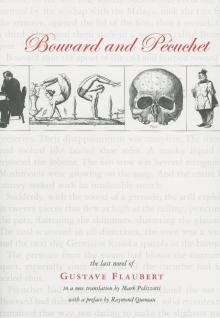 Bouvard and Pecuchet
Bouvard and Pecuchet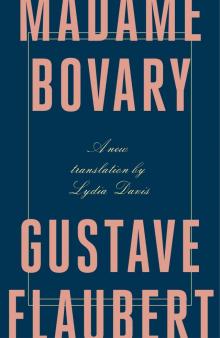 Madame Bovary
Madame Bovary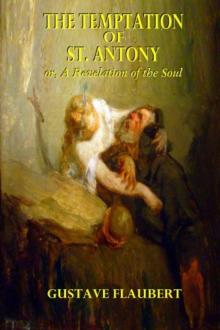 The Temptation of St. Antony
The Temptation of St. Antony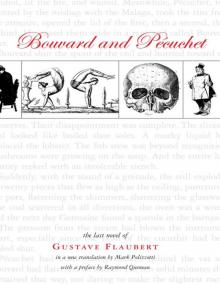 Bouvard and Pécuchet: A Tragi-comic Novel of Bourgeois Life, part 1
Bouvard and Pécuchet: A Tragi-comic Novel of Bourgeois Life, part 1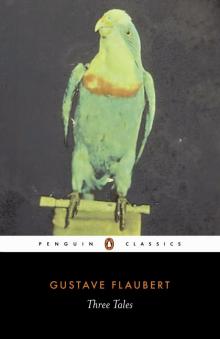 Three Tales
Three Tales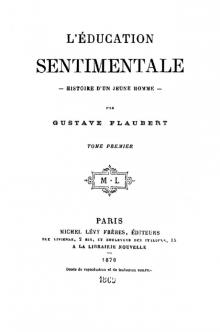 Education sentimentale. English
Education sentimentale. English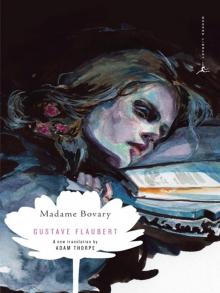 Madame Bovary (Modern Library)
Madame Bovary (Modern Library)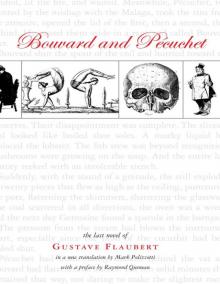 Bouvard and Pécuchet: A Tragi-comic Novel of Bourgeois Life, part 2
Bouvard and Pécuchet: A Tragi-comic Novel of Bourgeois Life, part 2 Sentimental Education; Or, The History of a Young Man. Volume 1
Sentimental Education; Or, The History of a Young Man. Volume 1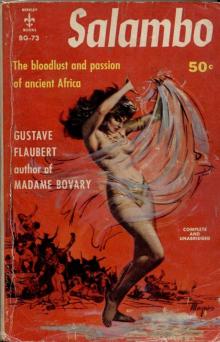 Salammbo
Salammbo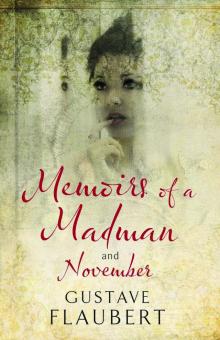 Memoirs of a Madman and November
Memoirs of a Madman and November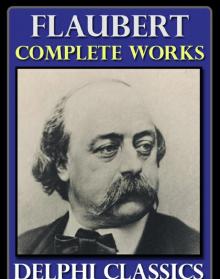 Complete Works of Gustave Flaubert
Complete Works of Gustave Flaubert